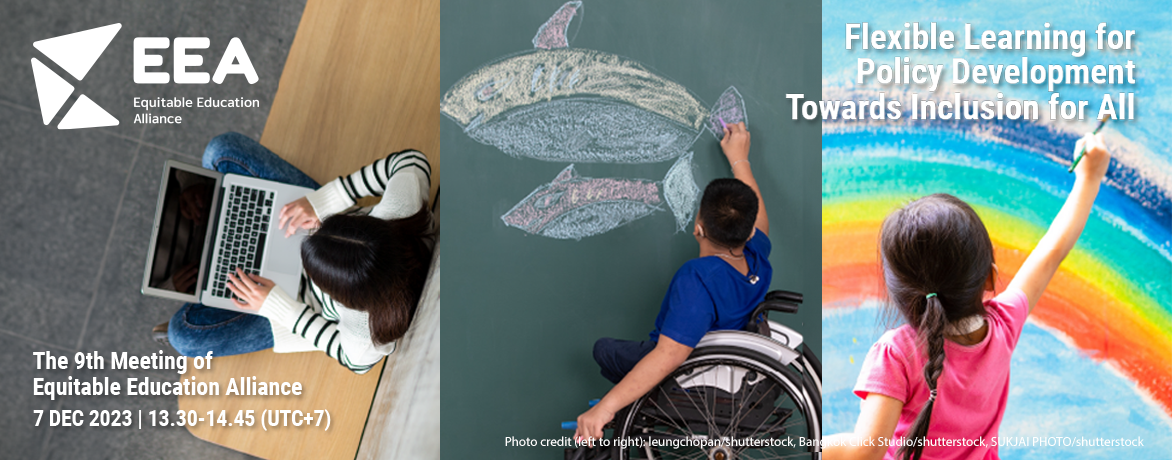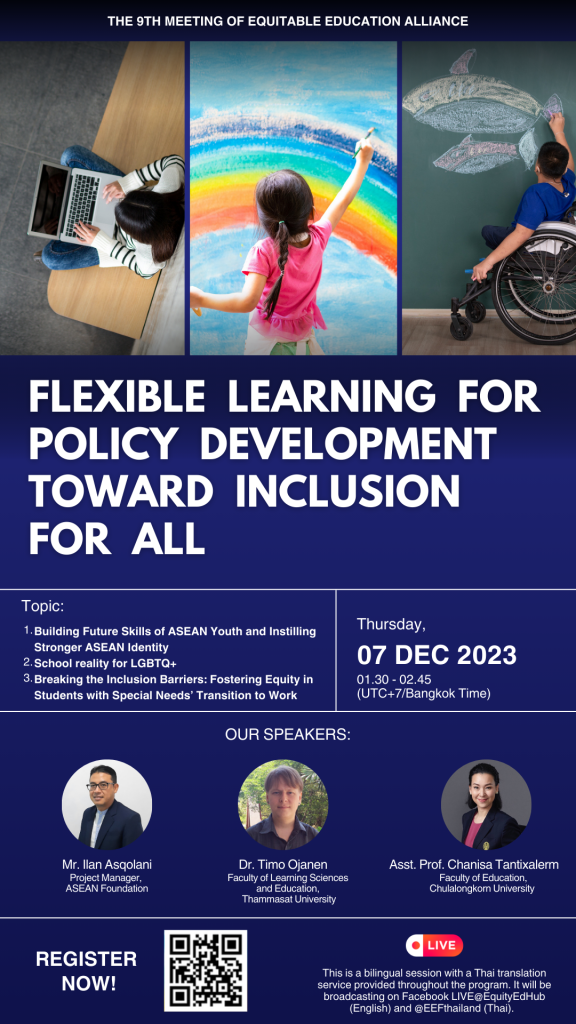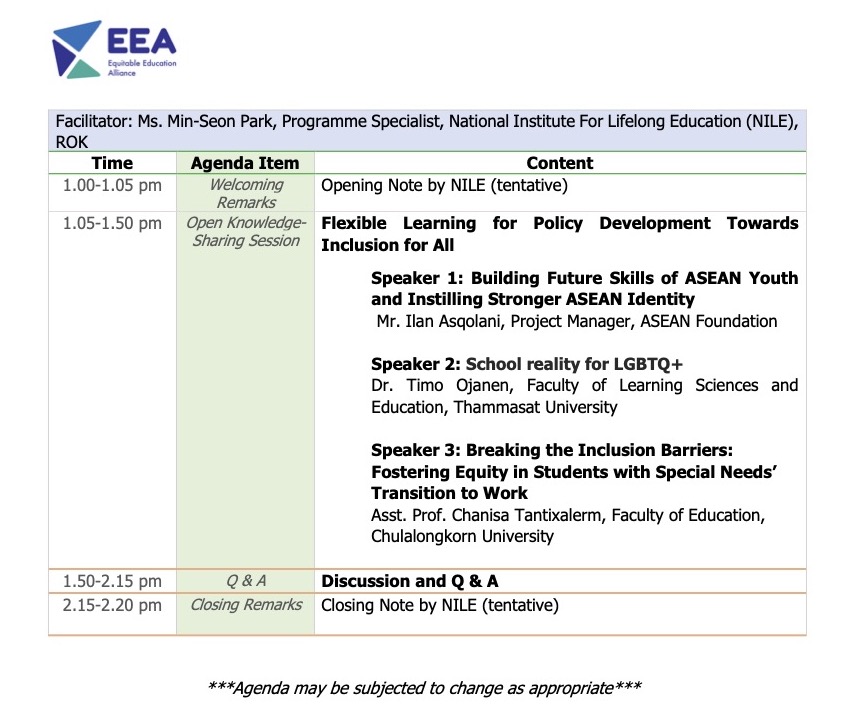
The Equitable Education Alliance (EEA) to host the 9th EEA Meeting Webinar
The 9th EEA Meeting in December 2023 highlights ‘Flexible Learning for Policy Development Towards Inclusion for All’
The Equitable Education Alliance (EEA; est. 2020), co-chaired by the Equitable Education Fund (Thailand) and the UNESCO Regional Office in Bangkok, is a community of organizations, government ministries, agencies, and NGOs advocating a more inclusive and equitable educational system in the region, while simultaneously enhancing the performance of existing equitable education organizations at all levels.
The EEA convenes four meetings annually to discuss and improve equity in education through collaborative efforts. To date, 18 countries and 22 local and international organizations have participated in these meetings, mutually sharing the expertise they are applying to promote and foster equity in education systems locally and regionally.
In the Asia and Pacific region, young workers are increasingly educated yet lack decent work opportunities in the COVID-19 period. One in four young workers is living in conditions of extreme or moderate poverty (below US$3.20/day), versus 18 percent of adults. Globally, 30 percent of young people were NEETs (Not in Education, Employment, or Training). Nearly three-quarters of NEETs in Asia and the Pacific are young women, many of whom engage in care and own-production work at home.[1]
Moreover, there is a need to create a more inclusive school environment for LGBTIQ+ youth, as well as for students with special needs. Discrimination at school faced by LGBTIQ+ youth remains a crucial issue, as they continue to encounter higher rates of various kinds of campus-based violence, and roughly 45 percent of them globally report being bullied[2]. This situation results not only in rising dropout rates and lower academic performance but also has the potential to negatively impact a young learner’s physical and mental health well beyond their school years. Greater efforts must be made to increase these learner’s sense of safety and engagement throughout their school activities. In addition, students with special needs should be especially considered towards fulfilling the goals of Education for All, given that 50 percent of children with disabilities have been recently reported as not attending school in the developing countries of Asia-Pacific, with the rate of non-attendance as high as 90 percent in some rural areas.[3] To this end, educators must act promptly and respond positively to all learners with particular disabilities or difficulties throughout their studies. Joint contributions from schools and governments towards strengthening technical assistance inputs and providing more bespoke curricula are also required to ensure more inclusive schooling for all.
In response to these issues, as well as others, the 9th EEA Meeting will highlight the theme ‘Flexible Learning for Policy Development Towards Inclusion for All’ as it applies to the national and local levels. The 9th EEA Meeting also aims to summarize the successes, challenges, and general reflections of EEA in 2023, and to initiate potential collaborative opportunities by identifying contact points that might together act as a basis for the further development of EEA itself, and for the development of key EEA activities and the monitoring of their progress in 2024.
As an ongoing complement to the annual EEA meetings, the Equitable Education Hub (EquityEdHub, or EEH) was launched in 2022 as a knowledge-sharing hub expressly intended to 1) enable learners from around the world to readily access content on several topics about the EEA’s goals towards improving equity in education through collaborative efforts; and 2) provide substantive and technical support to those in need.
Objectives – 9th EEA Meeting Webinar
Public Session:
- Share insights and strategies regarding educational policies for gender minorities to understand what proactive steps schools, governments, and legal systems can take to prevent bullying, promote understanding, and enhance the mental well-being of young learners. Explore the hurdles and achievements in implementing comprehensive sexuality education (CSE) in Thailand, and examine the future directions for CSE implementation on both national and local levels
- Share the project implementation, development, and outcomes of regional organizations, such as the ASEAN Foundation, to support young workers and youth who are currently not in employment, education, or training (NEET), and demonstrate how to provide flexible learning opportunities to underserved groups in ASEAN by collaborating with external stakeholders
- Present a case study and recommendation to break the inclusion barriers and move toward fostering equity in students, especially in special needs who will transition to work workplace.
- Explore the various measures that governments, educational institutions, and educators can undertake to enhance support and technical assistance for the effective inclusion of special needs students in mainstream education
Participants
- Local education administrators, district directors, school principals, teachers and other partners promoting equity in education
- Practitioners; LGBTQ+ communities, education practitioners for NEETs, students with special needs, and LGBTQ+ groups
- Potential EEA members, including government agencies, policy-makers, NGOs, academics, and like-minded organizations and countries
- EEA members, including Member States, countries and organization representatives, practitioners, technical experts, and international agencies that advocate and work towards equitable education.
Dates and Venue
Thursday, 7 December 2023, online webinar, 13.30–14.20 (UTC+7)
Zoom Link: https://unesco-org.zoom.us/webinar/register/WN_1L9Tn9WUSz–kepBf-RFug#/registration
Please register in advance for this meeting. After registering, you will receive a confirmation email containing information about how to join the proceedings. Note: The capacity of the Zoom meeting is 500 participants on a first-come, first-served basis.
The 9th EEA Meeting will be live-streamed on the EEH Facebook page in English, and the EEF Thailand Facebook page in Thai. This is a bilingual session with a Thai translation service provided throughout the program.
[1] Tackling the COVID-19 youth employment crisis in Asia and the Pacific: International Labour Organization, Bangkok (Thailand), and Asian Development Bank, Manila (Philippines), 2020.
[2] LGBTIQ+ youth: bullying and violence at school. UNESCO. 2023
[3] 2ND ASIA-PACIFIC REGIONAL EDUCATION MINISTER’S CONFERENCE outcome document. UNESCO. 2022


Additional Details
Event Introduction

